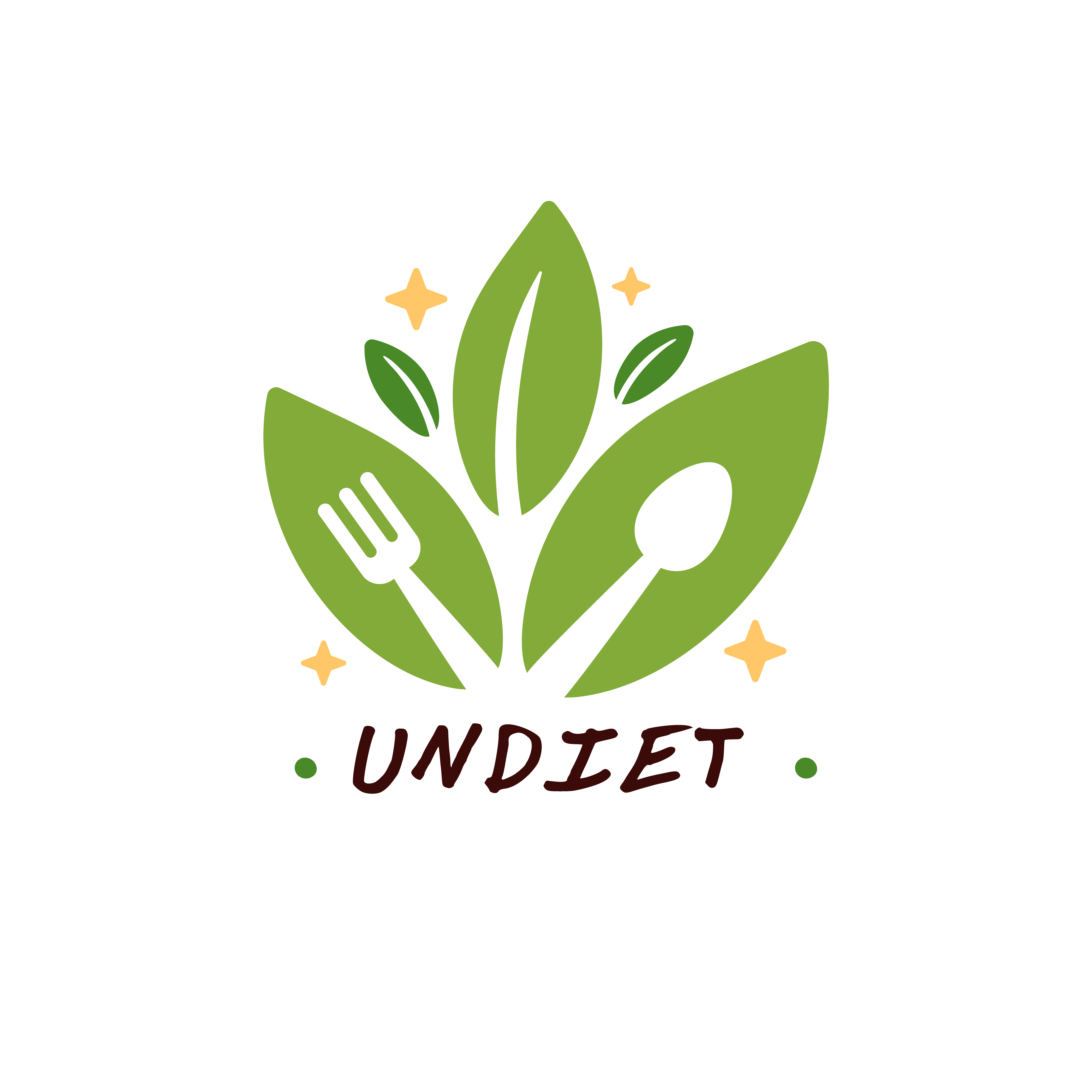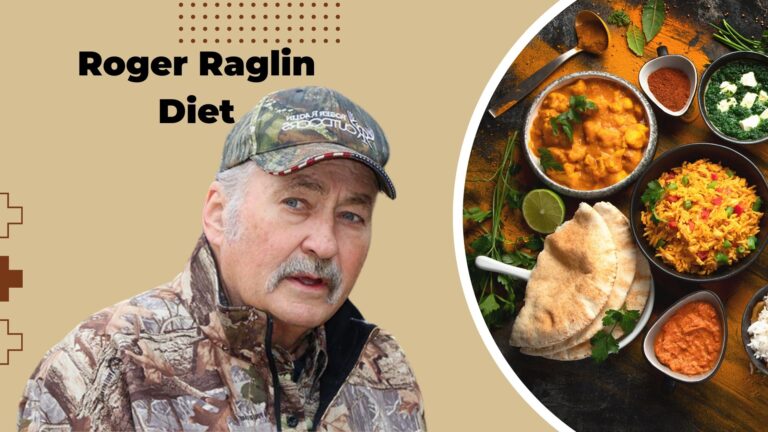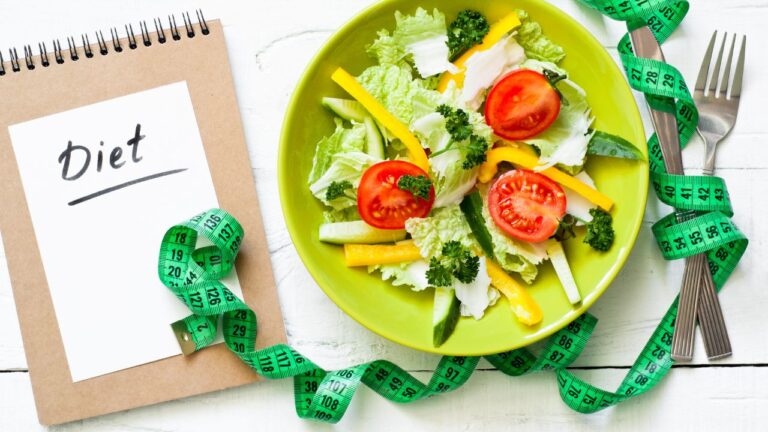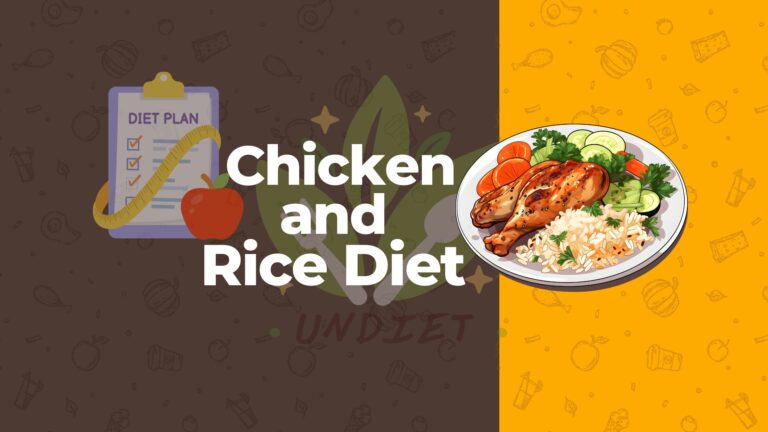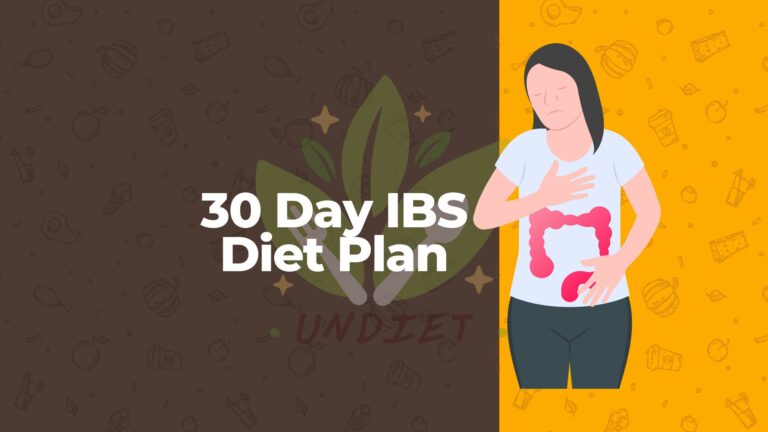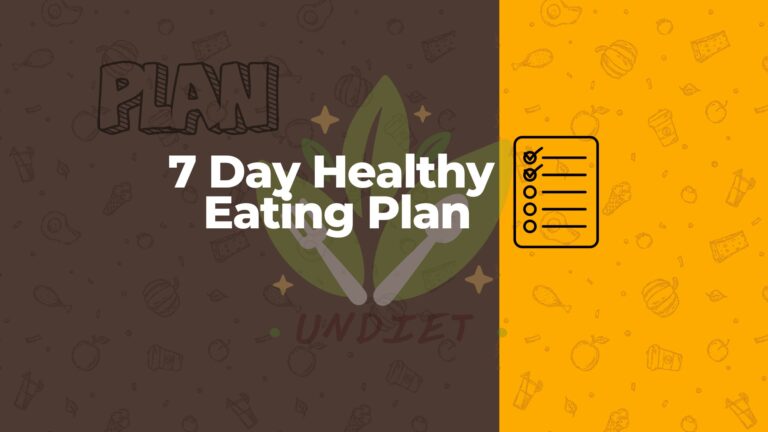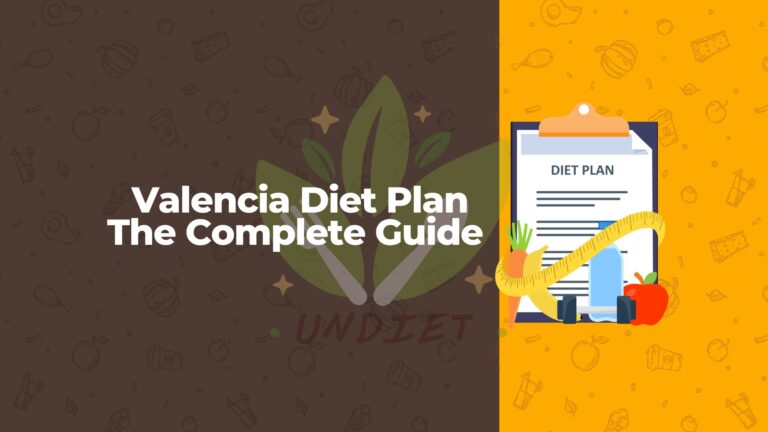The Best Diet to Lose Weight and Gain Muscle: A Complete Guide
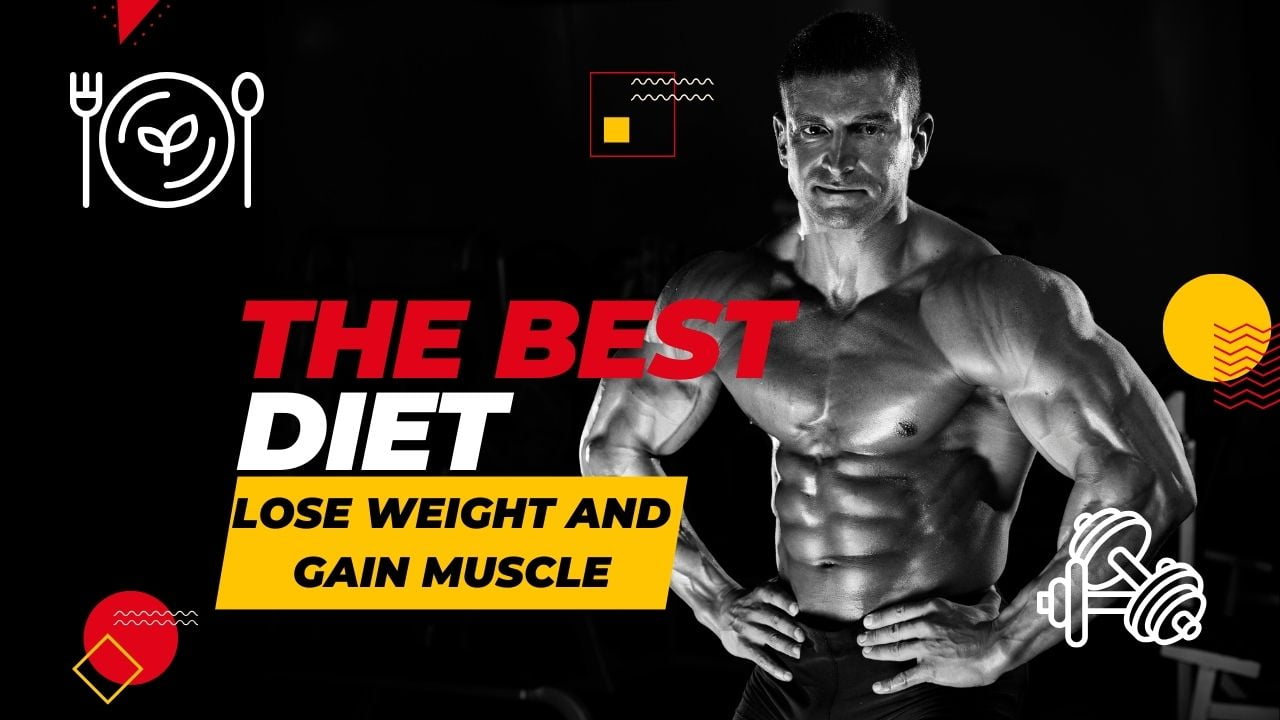
Are you excited about What is the Best Diet to Lose Weight and Gain Muscle? People want to stay cool and healthy in today’s society. Therefore, they desire a muscular, fit body. I’ll give you a detailed explanation of The Best Diet to Lose Weight and Gain Muscle in this article. I hope you can lose weight and build muscle if you carefully follow this complete guide.
Introduction of The Best Diet to Lose Weight and Gain Muscle
Diet is Important for Losing Weight and Adding Muscle
Your nutrition is one aspect that is crucial to reaching your fitness goals, whether they involve losing excess weight or developing lean muscle. While eating well is equally as important, if not more so, in deciding your success, exercise has a place in a healthy lifestyle. This blog will discuss the significant role that diet plays in both weight reduction and muscle growth. You’ll also learn how choosing the appropriate foods can change the course of your fitness journey.
The Common Myths About Exercise and Diet
There are many myths and misconceptions about nutrition and exercise in today’s age of information overload. These myths might mislead you and make it more difficult for you to achieve your fitness objectives. To assist you in making wise choices regarding your diet and exercise regimen, we’ll dispel some of these beliefs and replace them with knowledge based on evidence.
A Summary of the Blog’s Main Ideas
We’ll go into more detail on the connection between diet, activity, and the makeup of your body in the sections that follow. Here’s a sneak preview of what you can learn:
- The Function of Calories: Discover why the age-old adage “calories in versus calories out”—while still essential to weight management—is not as straightforward as it might seem.
- Explore the significance of macronutrients (carbohydrates, proteins, and fats) and how the proportions of each in your diet can affect the development of muscle and the reduction of body fat.
- Timing and Meal Frequency: Learn how your eating habits might impact your metabolism and physical development.
- Learn the importance of choosing full, nutrient-dense foods versus processed ones and how they affect your general health.
- The Function of Supplements: Discover how supplements are used and whether they may fill up nutritional deficiencies in your diet.
- Exercise Synergy: Recognize how your nutrition combines with your exercise program to maximize your chances of success.
By the end of this blog, you’ll have a better grasp of the significance of diet, the misconceptions about food and exercise, and useful tips to turn nutrition into a potent ally in your quest for fitness. Let’s begin the journey to a fitter, healthier you.
Understanding The Best Diet to Lose Weight and Gain Muscle
It’s crucial to appreciate the idea of caloric balance to understand how weight loss and muscle gain function. The link between the calories you eat from food and beverages and the calories your body expends from everyday activities and exercise is known as caloric balance. You establish a calorie deficit and lose weight when you consume fewer calories than you burn. On the other hand, weight gain happens when you consume more calories than you burn.
The Value of Resistance Training in Building Muscle
Diet alone won’t help you gain muscle; resistance training is also crucial. Exercises that include strength, such as bodyweight exercises or weightlifting, are essential for promoting muscular growth. Muscle fibers suffer tiny injuries from resistance training, which they then heal and strengthen during the recovery period. This procedure is necessary to get that lean, muscular figure.
Choosing Realistic Weight Loss and Muscle Gain Goals
Although it’s common to want to see quick changes, it’s important to set weight reduction and muscle growth objectives that you can achieve. Excessively strict diet plans and unduly demanding exercise routines can result in burnout and disappointment. Instead, concentrate on slow growth and acknowledge tiny accomplishments along the way. Keep in mind that for lasting outcomes, consistency and patience are essential.
The details of caloric balance, the subtleties of resistance training, and useful advice for defining and reaching your fitness objectives will all be covered in more detail in the next sections. Knowing these concepts will enable you to choose your diet and exercise program wisely to achieve your ideal weight and muscle mass.
The Best Diet for Weight Loss
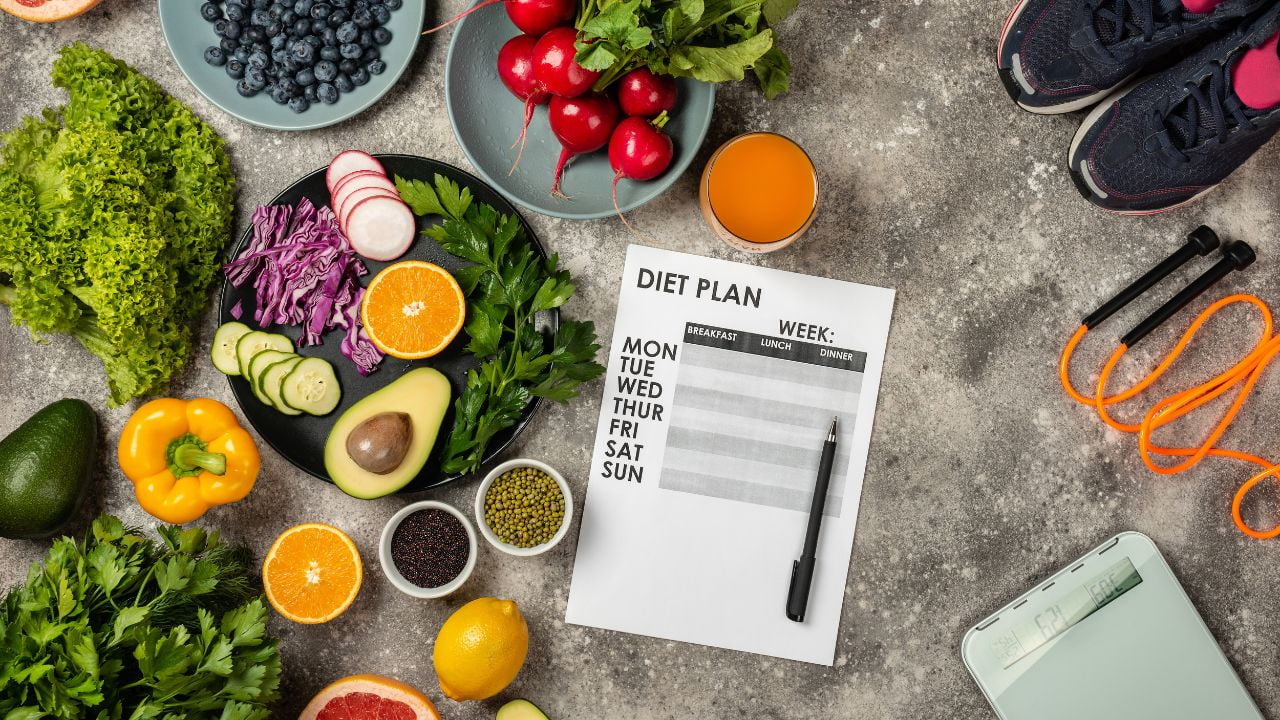
It all comes down to creating a calorie deficit when trying to lose those excess pounds. Simply put, you must expend more calories than you take in. However, it involves more than just keeping track of calories. Here is a breakdown of the things to think about:
Calorie Deficit: A Brief Introduction
The calorie deficit is the cornerstone of any effective weight loss endeavor. You must regularly consume fewer calories than your body uses up if you want to lose weight. Combining eating less and moving more can help you achieve this. Knowing how many calories you need to maintain your present weight or maintenance calories, is essential. You should consume less calories than this if you want to lose weight.
Selecting an Appropriate Macronutrient Balance
While maintaining a calorie deficit is important, your diet’s makeup is also important. Your success is greatly influenced by your macronutrient balance or the proportion of carbohydrates, proteins, and fats in your diet. Both weight loss and muscle mass preservation require a balanced diet with an optimal distribution of these macronutrients.
Best Diets for Losing Weight
There isn’t a single diet that works for everyone, but several well-liked diets have shown promise in helping people lose weight. A few of these are:
- Diets low in carbohydrates can assist control of blood sugar levels and encourage fat loss.
- The eating pattern known as intermittent fasting alternates between eating and fasting intervals, possibly creating a calorie deficit.
- Mediterranean diet: This diet, which is high in fruits, vegetables, whole grains, and healthy fats, is linked to long-term weight loss.
- A diet heavy on plant foods can help you lose weight because they have fewer calories per serving.
Tips for Meal Preparation and Portion Control
The decisions you make in the kitchen might have a big impact on your ability to lose weight. You can stay on track by meal planning and controlling your portion sizes.
To prevent making impulsive, unhealthy decisions, plan and prepare your meals in advance.
Portion sizes can be managed by using smaller dishes and bowls.
Pay attention to your hunger signals, and only eat until you are full, not stuffed.
In conclusion, the greatest diet for weight loss is one that generates a calorie deficit that is both sustainable and has the ideal ratio of macronutrients. Finding a dietary strategy that suits your interests and way of life is important. You’ll be on the right track to losing weight if you combine this with food planning and quantity control. Keep in mind that adopting a healthier, more balanced diet is just as important as losing weight.
The Best Diet for Muscle Gain
Significant muscle gain takes more than simply frequent gym attendance; it also necessitates a well-planned diet that promotes growth and recovery. We’ll go into the essential elements of a successful muscle-building diet in this section.
Calorie Surplus: A Brief Introduction
You must consume more calories than you expend to grow muscle. This entails consuming more calories each day than your body expends. The extra energy needed for muscular growth is provided by this surplus. To avoid excessive fat growth, it’s crucial to find the correct balance. A slight excess of 250–500 calories per day is what you should aim for as this will assist muscle building without causing considerable fat storage.
The Ideal Macronutrient Ratios to Promote Muscle Growth
Your diet’s macronutrient composition is crucial for building muscle. Fats, proteins, and carbs all have different purposes:
- The building blocks of muscles are proteins. Aim to consume 1.2 to 2.2 grams of protein per kilogram of body weight per day. Excellent sources include lean meats, fish, poultry, dairy products, and plant-based foods like tofu and lentils.
- Carbohydrates: Carbs assist muscles in recovering from strenuous exercise and restore their glycogen stores. Your daily intake of complex carbohydrates from foods like whole grains, fruits, and vegetables should account for a large percentage of this.
- Healthy fats help the generation of hormones and overall wellness. Include foods like olive oil, almonds, seeds, and avocados in your diet.
The Value of Foods High in Protein
In a diet designed to build muscle, protein is very important. A stronger thermic effect means it has more calories burned during digestion in addition to providing the essential amino acids for muscle growth and repair. Every meal should contain protein-rich foods to guarantee a constant supply of amino acids throughout the day.
Strategies for Timing Meals and Nutrient Intake
The timing of meals can affect muscle growth and recuperation. Think about the following tactics:
- Pre-Workout Nutrition: Eat a nutritious lunch or snack with both carbohydrates and protein about one to two hours before your workout. Your muscles will receive energy and amino acids from this.
- Post-Workout Nutrition: Prioritize a meal or smoothie that is high in protein and carbohydrates after your workout. This starts the process of muscle regeneration and replenishes glycogen stores.
- Spread Your Meals Out: To provide a constant supply of nutrients to your muscles throughout the day, aim for 4-6 smaller meals throughout the day.
- A quick snack before bed can help muscles recover themselves during the night.
The best diet for gaining muscle is one that maintains a calorie surplus while emphasizing macronutrient ratios that promote protein, complex carbohydrates, and healthy fats. Give protein-rich meals top attention and consider meal timing strategies to promote muscle growth and recovery. Recall that patience and consistency are the keys to building lean muscle.
Tips for Success in The Best Diet to Lose Weight and Gain Muscle
It takes perseverance, commitment, and a sound plan to reach your weight reduction and muscle gain goals. Here are some excellent pointers to aid you in your fitness endeavors.
Maintaining Hydration and Tracking Development
Although frequently disregarded, hydration is important for overall health and fitness. Maintaining proper hydration promotes healthy metabolism, strong muscles, and general well-being. Make it a practice to consume enough water throughout the day.
Tracking your development is also crucial. Keep a notebook or log your workouts, diet, and any changes to your body composition using a fitness app. You can maintain your motivation and make the necessary changes to your plan by regularly evaluating your progress.
Adding Bonus Meals and Rest Days
Even while it’s important to have a strict diet, treating yourself once in a while can still be beneficial for your fitness goals. These meals offer a mental respite and can help avoid deprived emotions. Just keep in mind to only consume them seldom.
The importance of rest days is equal. After challenging workouts, your body needs time to mend and recuperate. Overtraining can harm you and impede your development. Accept rest days as a vital component of your schedule so that your muscles may recover and develop.
Avoiding Typical Diet Mistakes
Dieting frequently involves difficulties and dangers. Keep the following in mind to keep on course:
- Avoid excessive diets: excessive calorie-cutting or fad diets might damage your metabolism and are not sustainable. Instead, choose a well-balanced, long-term strategy.
- Be mindful of your portion sizes and refrain from mindless nibbling. Emotional eating can hinder your development.
- Keep calm: It takes time to do the Best Diet to Lose Weight and Gain Muscle.
Don’t let slow development or sporadic setbacks demotivate you. If you are consistent, you will see results. - Avoid comparing your progress to that of others because each person’s body is different. Concentrate on your path and objectives.
Seeking Advice from a Professional
Consider consulting a specialist if you have specific health problems or questions regarding your food and exercise regimen. A skilled trainer can develop a fitness regimen suited to your objectives and capabilities, while a licensed nutritionist can assist you in developing a personalized eating plan. Their knowledge could significantly impact your success.
As a result, a well-rounded strategy that incorporates appropriate hydration, occasional indulgences, rest days, and mindfulness can lead to success in weight loss and muscle building. Stay patient, avoid typical dietary traps, and don’t be afraid to ask for help from experts when you need it. You are on the right path to a better, healthier version of yourself.
Sample Meal Plans for The Best Diet to Lose Weight and Gain Muscle
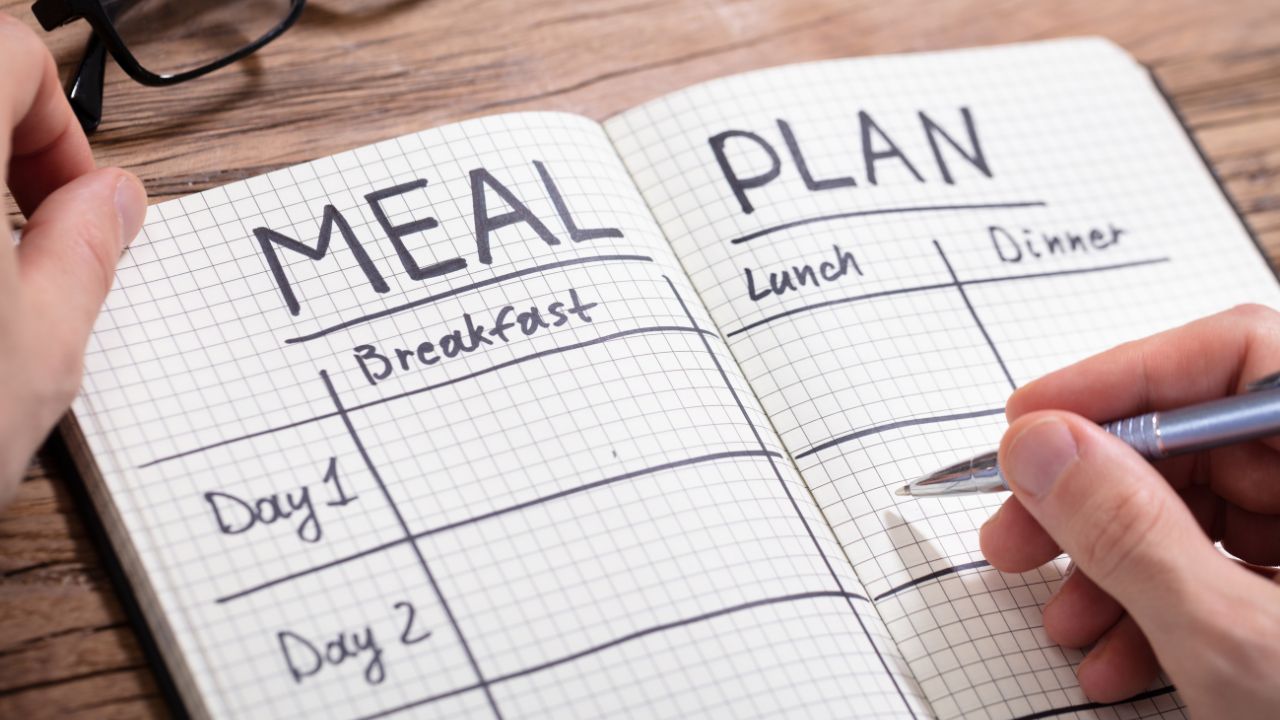
Your diet is crucial to your success whether your goals are to lose weight, build muscle, or accomplish a combination of both (body recomposition). Here are some sample meal menus for each objective.
Sample Meal Plan for Weight Loss
Breakfast:
- Scrambled eggs with spinach and tomatoes
- Whole-grain toast
- A small serving of mixed berries
Mid-Morning Snack:
- Greek yogurt with a drizzle of honey
- A handful of almonds
Lunch:
- Grilled chicken breast salad with mixed greens, cherry tomatoes, cucumbers, and balsamic vinaigrette dressing
Afternoon Snack:
- Carrot and celery sticks with hummus
Dinner:
- Baked salmon with steamed broccoli and quinoa
Evening Snack (optional):
- A piece of fruit, like an apple or pear
Sample Meal Plan for Muscle Gain
Breakfast:
- Protein-rich smoothie with whey protein, Greek yogurt, banana, and almond butter
- Oatmeal with chia seeds and berries
Mid-Morning Snack:
- Hard-boiled eggs
- Whole-grain crackers
Lunch:
- Grilled steak with a side of sweet potato and roasted vegetables
Afternoon Snack:
- Cottage cheese with pineapple chunks
Dinner:
- Baked chicken thighs with quinoa and steamed asparagus
Evening Snack (optional):
- A small serving of mixed nuts
Combining Meal Plans for Body Recomposition
Body recomposition consists of reducing body fat while gaining lean muscle. You need a well-rounded strategy that incorporates components of the two meal plans discussed above to do this. Here is an example:
Breakfast:
- Protein-rich smoothie (as in the muscle gain plan)
- A small serving of mixed berries (as in the weight loss plan)
Mid-Morning Snack:
- Greek yogurt with a drizzle of honey (from the weight loss plan)
Lunch:
- Grilled chicken breast salad (from the weight loss plan)
- Add a portion of quinoa or brown rice for extra carbs to support muscle gain
Afternoon Snack:
- Cottage cheese with pineapple chunks (from the muscle gain plan)
Dinner:
- Baked salmon with steamed broccoli and quinoa (from the weight loss plan)
- Increase the portion size of salmon for extra protein
Evening Snack (optional):
- A piece of fruit (from the weight loss plan) or a small serving of mixed nuts (from the muscle gain plan)
Keep in mind that since these are just examples, every person has different dietary demands. Adapt your calorie intake and portion sizes to your unique objectives and level of activity. As mentioned in the section “Tips for Success,” staying hydrated and keeping track of your progress is also important.
Supplements for The Best Diet to Lose Weight and Gain Muscle
Whether you’re trying to lose weight, build muscle, or just improve your general health, supplements can be a great way to support your fitness objectives. In this area, we’ll examine the function of supplements, go over several well-liked choices, and stress the significance of speaking with a healthcare professional before including them in your routine.
How Supplements Help You Lose Weight and Build Muscle
Although supplements are not miracle cures, they can support a healthy diet and exercise program. Their main responsibilities include improving performance, optimizing recuperation, and bridging nutritional shortages. How supplements can help with your fitness goals is as follows:
- Enhancement of nutrients: Some supplements include vital vitamins and minerals that may be missing from your diet, ensuring that your body performs at its best during exercise and recovery.
- Performance Boost: Certain vitamins can improve workout performance by elevating stamina, concentration, and vitality. This might encourage you to exert more effort during your workout, which might result in better outcomes.
- Support for Recovery: Supplements like protein powders and amino acids can help rebuild muscles and lessen discomfort after exercise, promoting speedier recovery.
Well-liked Supplements for Fitness Objectives
Protein Powder: Convenient forms of protein such as whey, casein, and plant-based protein powders can help you achieve your daily protein requirements. They are notably advantageous for muscular growth and recuperation.
- When engaging in high-intensity, brief-duration sports like weightlifting, creatine monohydrate is recognized for improving muscle strength and power.
- Leucine, isoleucine, and valine are examples of branched-chain amino acids (BCAAs), which aid in muscle repair and lessen pain. They are frequently consumed before, during, or following workouts.
- Fish oil supplements are a good source of omega-3 fatty acids, which are necessary for good health and have anti-inflammatory qualities.
- Multivitamins: Taking a high-quality multivitamin can help fill in nutritional gaps in your diet and guarantee that you receive all the vitamins and minerals you need.
- Caffeine and other substances are frequently found in pre-workout supplements, which are used to increase energy, focus, and endurance before an exercise.
- Green Tea Extract: By boosting metabolism and fat oxidation, green tea extract’s antioxidants and other components may aid in weight management.
- Fiber supplements can speed up digestion and make you feel fuller, both of which can help with weight loss efforts.
Speaking with a healthcare professional
It’s important to speak with a healthcare professional before including any supplements in your workout regimen, especially if you have underlying health concerns or are taking medication. Why this action is crucial is as follows:
- Safety: Some supplements may interact negatively with prescription drugs or make some medical conditions worse. Potential dangers can be evaluated by your healthcare physician.
- Personalization: To ensure you use supplements safely and successfully, your healthcare practitioner can assist you in making decisions that are in line with your unique goals and medical requirements.
- Dosage Advice: They can offer advice on appropriate dosages to prevent misuse or inefficiency, which might affect your outcomes.
In the end, supplements can be valuable allies in your weight loss and muscle gain journey, but they should be used wisely and alongside a balanced diet and exercise. Always get the advice of a healthcare professional to make sure the supplements you choose are secure and suitable for your specific requirements.
Conclusion of The Best Diet to Lose Weight and Gain Muscle
In this complete guide, we’ve explored the critical role of diet in achieving your weight loss and muscle gain goals. Here are the main ideas to remember:
- Diet is a cornerstone of success: When it comes to achieving your fitness objectives, your diet is equally as crucial as exercise, if not more so.
- Myth-busting: By dispelling widespread beliefs about nutrition and exercise, we have given you the correct facts.
- Meal plans for your objectives: As a starting point for structuring your diet, we’ve offered sample meal plans for weight loss, muscle gain, and body recomposition.
- Supplements as tools: Supplements can help you on your path, but you should use them carefully and with medical advice.
Motivating readers to prioritize their diet and take action
Your daily decisions set the course for a fitter, healthier you. Your diet is a lifetime commitment to your health, not a quick fix. Although the trip has its ups and downs, the result is worthwhile.
The time has come to act. Put the information you’ve learned from this tutorial to use in your regular activities. Make gradual, lasting modifications to your diet and fitness regimen to start. The most important thing is consistency, and even the slightest advances over time can add up to big gains.
Inspirational Finale
Remember that accomplishing your fitness objectives involves more than simply physical change; it also involves feeling stronger, more self-assured, and healthier. You’ll encounter difficulties, setbacks, and moments of uncertainty along the path. But you can conquer anything if you have perseverance and determination.
Maintain your motivation, surround yourself with a strong support network, and never undervalue the influence of your decisions. Every step you take on the road to weight loss, muscle building, or body composition change is a step closer to your objectives.
Accept the process, practice self-compassion, and never give up. The work is worthwhile for your health and well-being. The outcomes will speak for themselves as you continue along this path, and you’ll find that the journey itself is a reward. I wish you health, strength, and happiness.
Frequently Asked Questions (FAQs)
What should I eat to lose weight and gain muscle?
- To lose weight and gain muscle, focus on a nutritious diet rich in lean proteins, whole grains, fruits, vegetables, and healthy fats. Keep an eye on your caloric consumption, drink plenty of water, and think about getting advice from a dietician or nutritionist. For optimal results, combine this diet with regular exercise that includes both strength training and cardiovascular routines.
What is the fastest way to lose weight and gain muscle?
- The fastest way to lose weight and gain muscle is through a combination of workouts with high intensity a balanced diet with adequate protein, and consistency in both exercise and nutrition. However, it’s essential to note that significant changes take time, and crash diets or extreme exercise routines are not appropriate or healthy approaches. To succeed in the long run, improvement must be gradual and sustainable.
Can you lose fat and gain muscle at the same time?
- Yes, it’s possible to lose fat and gain muscle simultaneously, but it’s challenging. A balanced diet, appropriate exercise, and patience are frequently needed to achieve both objectives.
What type of foods burn fat?
- Lean proteins, high-fiber foods like fruits and vegetables, and foods that speed up the metabolism, like as green tea and spicy foods, are among the items that can aid in fat burning. The overall quality of your diet and the balance of your calorie intake, rather than any one food, is what is most important for fat loss.
What is the fastest way to lose fat in the world?
- The world’s quickest method of fat loss involves combining a strict calorie deficit with vigorous exercise and maybe drastic measures like fasting or extremely low-calorie diets. These strategies are not sustainable and are not advised for the majority of people, but they can be risky. The healthiest strategy for long-term success is a gradual, sustainable reduction in body fat achieved by a balanced diet and frequent exercise.
Additional Resources
- Books:
- “The Bodybuilder’s Nutrition Book” by Franco Columbu
- “Bigger Leaner Stronger” by Michael Matthews
- “The Complete Guide to Fasting” by Dr. Jason Fung
- Websites:
- MyFitnessPal: A popular app and website for tracking your diet and exercise.
- Bodybuilding.com: Offers a wealth of articles, workout plans, and nutrition tips.
- Precision Nutrition: Provides evidence-based nutrition information and coaching services.
- Fitness Apps:
- MyFitnessPal: Track your calorie intake, set fitness goals, and access a large database of foods.
- Fitbod: Generate personalized workout plans based on your fitness level and goals.
- Strava: Track your running and cycling activities, compete with others, and stay motivated.
